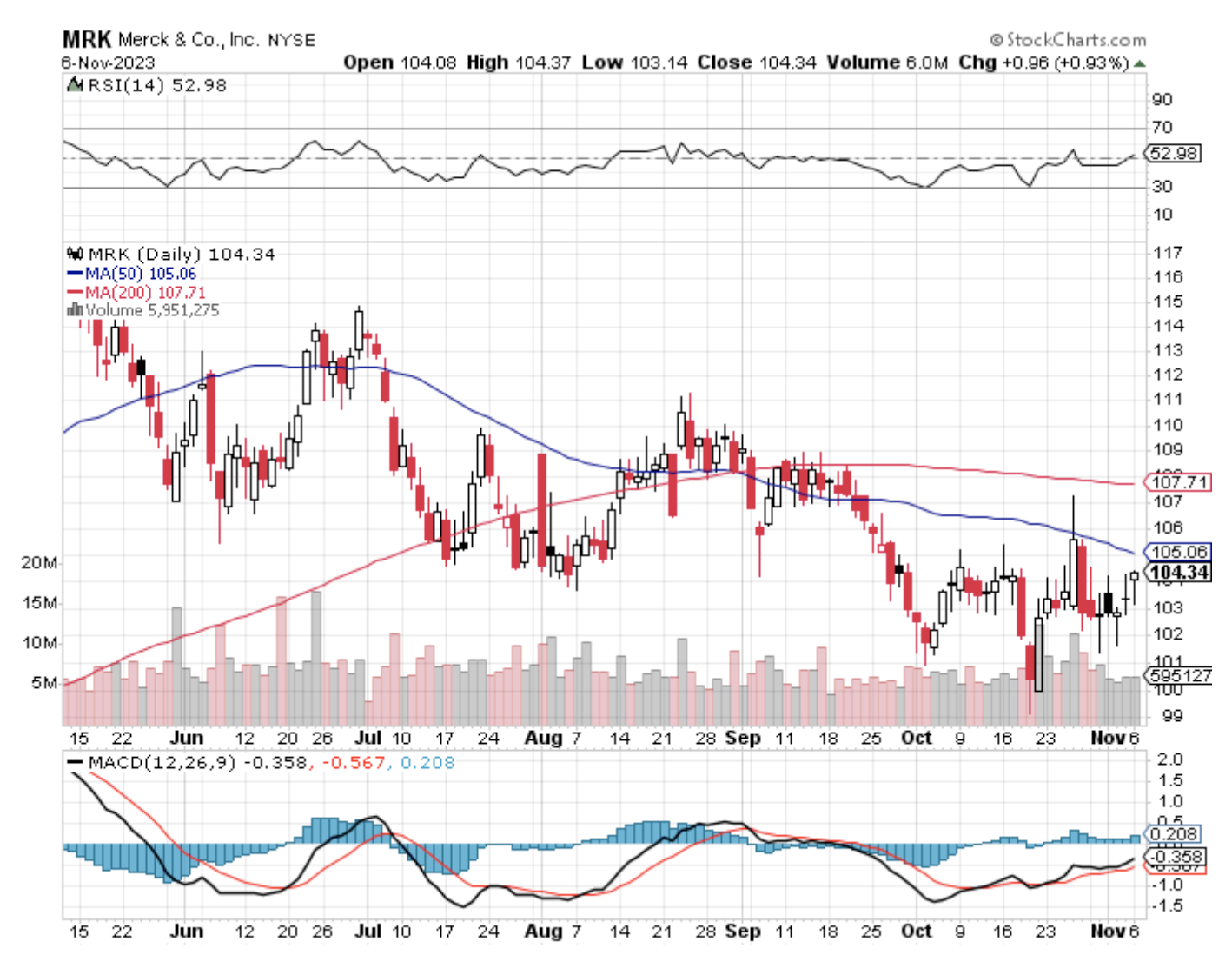An Underdog's Long-Term Play
When sifting through the financial performances this earnings season, a pattern emerges among pharmaceutical giants – a sell-off that persists whether the news is good or bad.
However, amidst this tumultuous landscape, there’s one name that stands out as a beacon of strategic success: Merck Pharmaceuticals (MRK).
The company’s financial metrics are noteworthy. Trading at 14 times forward earnings aligns with industry standards, signaling a stable investment to Wall Street. This valuation reflects not just current profitability but anticipates future earnings, a critical measure for savvy investors.
Merck's robust market cap of $262 billion indicates more than just its size; it signifies its influence and foresight in the biotech field.
Its recent collaboration with Japan's Daiichi Sankyo reflects this, involving a substantial $4 billion upfront investment for a partnership that could be worth up to $22 billion.
These figures aren't just impressive; they underscore Merck's commitment to advancing cancer treatment through a series of antibody-drug conjugates aimed at solid tumors.
However, everyone knows that the healthcare industry is a long game.
Merck exemplifies this, banking on long-term outcomes, particularly with Keytruda, its leading cancer drug. Bringing in $16 billion in Q3 revenue, Keytruda is a testament to Merck's ability to not only develop but also commercialize high-impact therapies.
Even as Keytruda's patent protection approaches its 2028 expiration, Merck is already grooming its pipeline, ensuring a succession of treatments to maintain its market dominance.
In the immediate term, Keytruda is on a trajectory to become the top-selling drug globally, with projections pointing towards a staggering $30 billion in sales by 2028. This continued success is not a cause for complacency; instead, it's a launching pad for Merck as it orchestrates its future portfolio with strategic precision.
That’s why the Daiichi Sankyo collaboration is pivotal even if these programs are still in the clinical trial phase.
The probability of a phase 1 trial leading to a marketable drug is a mere 3.4%, yet Merck's investment suggests confidence in these potential therapies. This foresight is critical for anyone looking beyond immediate gains toward substantial future returns.
Turning back the pages to November 2021, we find another example of Merck’s long-term outlook. At the time, the company made headlines with its acquisition of Acceleron Pharma, a move costing $11.5 billion. This strategic play wasn't a mere chance but a calculated maneuver to secure a promising asset: Sotatercept.
This drug represents a breakthrough for those battling pulmonary arterial hypertension, a severe condition that constricts blood vessels in the lungs and makes breathing a laborious task.
With analysts predicting Sotatercept's sales could soar to $2.6 billion by 2028, this acquisition is a decisive stride toward future profitability.
Shifting focus to Merck's diversified portfolio, there's more to its story than these treatments.
Its HPV vaccines, like Gardasil, represent a significant foray into preventive health. Meanwhile, its animal health division boasts the resilience of a bull market. Moreover, its R&D efforts are primed to usher in a new era of blockbusters as Keytruda nears the end of its patent life.
Dividend growth is another proof of Merck's financial health and investor-focused approach.
Over the past decade, dividends have increased by 66%, outpacing the average yield of the S&P 500. The current cash payout ratio suggests there's potential for growth, offering an attractive proposition for income-focused investors.
In the broader context of investment strategies, Merck's maneuvers construct a compelling narrative for a bullish stance. Overall, the company’s proactive and diverse approach to biotechnology makes it a noteworthy contender for investors seeking long-term growth.
While the stock market is often swayed by the immediate ebb and flow of quarterly earnings, Merck's consistent investment in their pipeline, strategic partnerships, and dividend growth paints the picture of a company poised for sustained success. I suggest you buy the dip.

